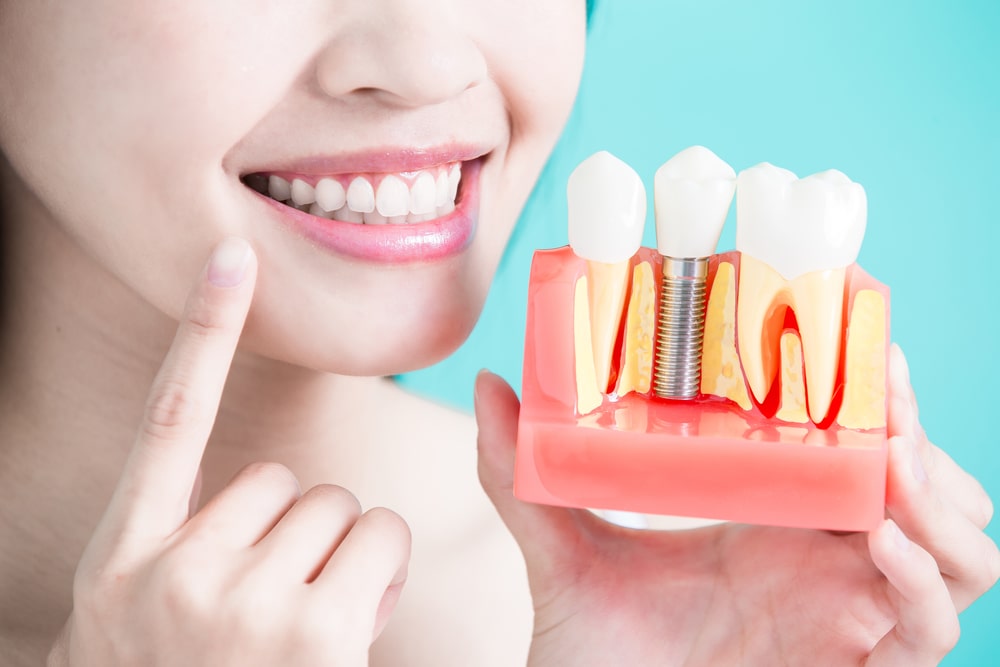Dental implants are one of the most effective and sturdy ways to replace one or more missing teeth. Although dental implants come with a higher price tag than other tooth replacement options, the results are well worth it. Dental implants can restore the look and function of natural teeth, allowing patients to maintain good bone health, eat foods they enjoy, and talk and smile with confidence.
Because dental implants are anchored into the jawbone, they can last a lifetime and restore the facial structure. If you’re looking for a dental implant dentist in Airdrie, you’ve come to the right place. Airdrie 8th Street dental offers dental implant services in a relaxed environment with a friendly team who will make you feel comfortable and taken care of. Keep reading to learn more about dental implants and if they’re right for you.
The benefits of dental implants
Dental implants are a permanent tooth restoration solution with a high success rate. Some of the benefits include:
- The closest restoration to your natural tooth structure
- Natural-looking appearance
- Conserves the surrounding structure of the teeth
- Conserves bone density
- Restores natural speech
- Restores chewing functionality
- Improves confidence in social settings
What to expect with dental implant surgery in Airdrie
The dental implant process differs between patients. For example, a patient may need bone grafting to support the implant before the surgery takes place while another patient may have a quicker process. The length of time the surgery takes depends on how many implants are being placed and if the process is combined with other restorative options such as a dental bridge or partial dentures.
While the complexity of the procedure is on a case-by-case basis, here’s what you can generally expect with dental implant surgery.
The initial consultation – The first appointment with your dentist will include assessing the health of your existing teeth and gums. Your dentist will ask a series of questions and provide some general information about the procedure. The main purpose of the first consultation is to determine whether you’re a candidate to receive dental implants.
Patients must have sufficient bone structure to qualify for dental implants. However, bone grafting is available for patients who lack the quality and quantity of bone needed to support dental implants. If you have a medical condition that affects your body’s ability to heal or if gum disease or present, you may be denied dental implants.
The pre-operation process – Depending on your situation, you may be referred to other specialists such as a periodontist, an ear-nose-and-throat specialist, or an oral surgeon. The pre-operation process typically includes X-rays, exams, additional testing, and bone grafting if needed.
During this time, you can speak to your dentist about sedation options and ask all of the questions you need to that will help prepare you for the surgery. Your dentist will talk to you about how to prepare for surgery day, including designating a friend or family member to drive you to and from the surgery, what to expect, and how to mentally prepare for the day of the surgery.
Phase 1: Implant Placement – Dental implant surgery happens in three phases: implant placement, attaching the abutment, and fitting the crown. On the day of the implant placement, you’ll be sedated or numbed with local anesthesia before the surgery begins.
Your dentist will make a small incision in your gum to expose the bone to create space for the implant screw. The screw is then put into place. You’ll be monitored for a few minutes before being discharged and will be given after-care instructions.
Phase 2: Attaching The Abutment – This phase typically happens about 4-6 months after placing the implant. This allows the gums to fully heal. Once your dentist has determined that you’re ready for the next step, it’s time to attach the abutment. Again, you’ll be sedated or given local anesthesia before the surgery begins.
Your dentist will make another small incision in your gums to expose the implant and fit the abutment in. Again, you’ll be monitored shortly after the procedure and given after-care instructions.
Phase 3: Crown Fitting – The third and final phase of the process is fitting the crown, which is the actual artificial tooth. Crowns are custom-made to fit your mouth and match the colour of your surrounding teeth. If you want a whiter smile, your dentist will recommend a professional whitening treatment before the artificial crown is made.
Fitting the crown may require a trial before the final fit. Once the crown is placed, your dentist will assess whether everything is as positioned as it should and let you get a feel of the new artificial tooth in your mouth. The results are quite remarkable – a functional, natural-looking, and sturdy tooth replacement.
Recovery time and post-surgery care
After a lengthy process, we want to make sure that everything is healing well. You’ll be given instructions on how to care for the artificial crown and we’ll schedule one or two follow-up appointments to monitor the health of your gums.
Once everything is complete, you can talk, eat, chew, and laugh without worrying about your artificial tooth replacement shifting out of place. One of our favourite moments at Airdrie 8th Street Dental is seeing our patients enjoy their newly restored smiles!


